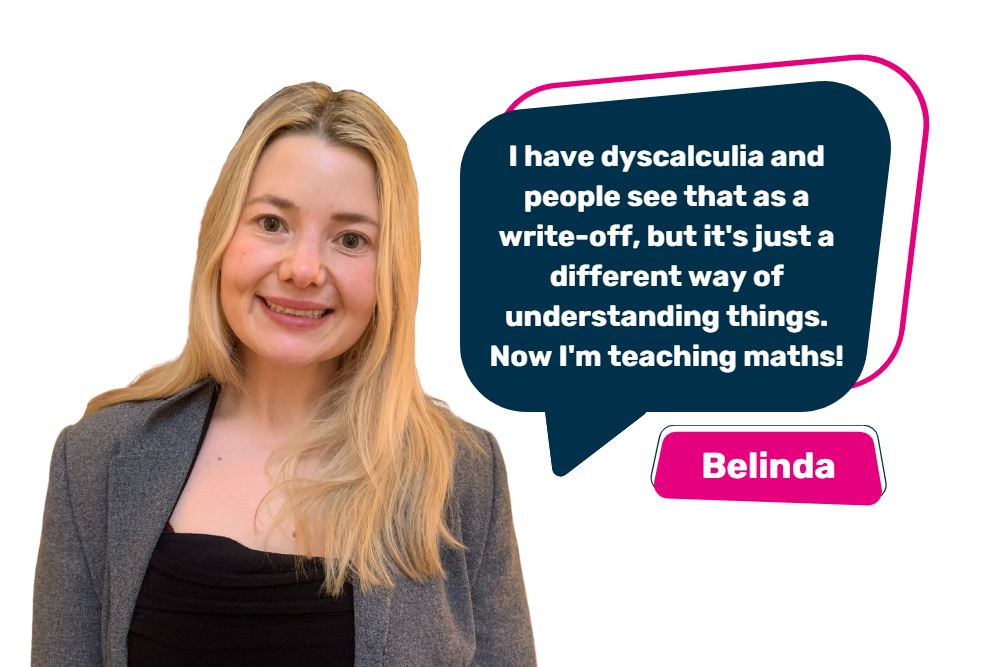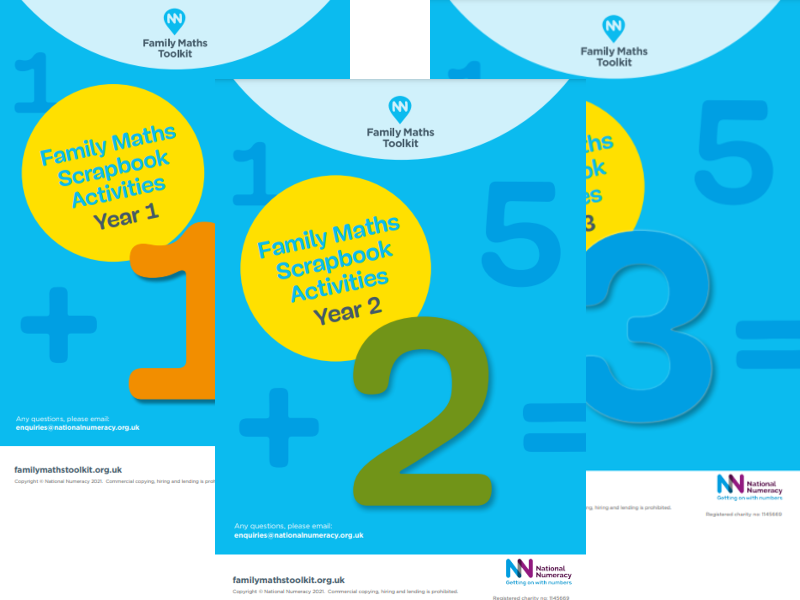How did you used to feel about maths?
Overwhelmed. Perplexed, confused, scared. There are so many words for how I used to feel, I was just terrified of numbers.
It started in school, but when I had teachers that took the time to teach me in different kinds of ways and recognised that not all students learn in the same ways, I would do really well. So I had the ability to do well when taught in a way I could understand, when encouraged and made to know that it’s okay to not know things straight away and given time and space. But most of the time, if I wasn’t, I would just go blank. Especially with abstract questions or big figures.
What motivated you to revisit maths after school?
As an adult I had to redo my GCSE for my PGCE – I needed a C in Maths, but got an E at school. It was daunting going back as an adult and doing my GCSE, and sometimes it was embarrassing to tell people, but I had to get it if I wanted to be a teacher – and that’s what I wanted to do. I wanted to help other children learn where I had felt I couldn’t.
I have dyscalculia, and I think a lot of people see that as a write-off and that you’ll never be able to do maths. But I think it’s just a different way of understanding things – I worked hard and ended up getting a B, and now I’m teaching maths! You learn in a different way and maybe you see the numbers in a different way, but you have to just be a bit more patient with yourself and not put the pressure on.
Understand that there is space for you to learn.
I had a really amazing teacher in college called Rosie, who really helped me to understand that just because you’ve not understood something when you were younger, doesn’t mean you can’t ever. It’s about finding the people that understand and can connect; and passing that knowledge on then helps us all to understand and help each other. Being dismissed and told you’re not good at something and constantly being berated makes you draw a blank and then not want to do things – but to have someone that encourages you and shows you different ways to look at the numbers really builds that confidence.
Find out your own numeracy level and start building number confidence
Do you find your number confidence helping in daily life?
Yes – I’ve recently started to budget and manage my money, and I find it really helps to understand it and be able to add the totals together, and understanding what deals you can get in what kind of way: “Is it worth it for me to buy these extra things because I’m going to get this one for free, or is it not?” Simple things like that really help within budgeting. With bills as well – especially with the way inflation is, it’s really, really hard for everyone. As a younger adult I used to literally just open and close my bills and put them in a drawer because it overwhelmed me, and I got into so much debt because of that. It’s so important to be comfortable enough with numbers that you can be on top of your finances and on top of your life. That really gives you confidence and manageability.
Numbers are the root of money, and that’s everything in the world of freedom.
It’s difficult if you maybe haven’t had the advantage of being brought up in a family network where it was normalised to understand money and having it. It is an essential part of living to be able to use numbers and use them to budget, to know what interest you’re going to get in a bank, and to be able to invest your own money.
Have a look at our maths for money resources
Can you think of a time you made a numeracy blunder?
I’ve constantly done things in the past like buying pictures that don’t fit frames, because in my head I’m like, “Oh I just can’t be bothered to measure, I’ll just guess,” and it just never works out! And it probably wouldn’t have taken that long to measure, but things like that can seem really hard in your mind. Or selling clothes second-hand, when people ask for measurements my brain will automatically panic, but it’s actually easy and quick to do.
And I’ve been at hairdressers before where they say, “we’re going to take off this many inches,” and I’m like, “yeah that’s fine!” because it sounds like nothing. Then when they do it you’re like, “Why is my hair so short?” and it’s because in my head I’m thinking that centimetres, millimetres and inches are all the same but they’re not!
How would you describe how you feel about maths now?
I feel confident – but confident that if I am confused by something in maths, I can look into it, because I know that I can learn things now. I feel confident that I can get there in a number of different ways, and it will be okay. I don’t feel anxious or terrified or scared like I used to.
I feel proud! Content, proud, and confident.
Why do you think other people should build their confidence with maths?
Building your confidence with numbers equals building confidence for yourself and within yourself. It’s not nice and it’s no way for anyone to live to have to go around fearing something or finding something daunting, and not being able to say – and maybe not being able to have a career in a job they want because they haven’t done an exam they need. Build your confidence so you’re comfortable around numbers so you can complete goals in life. My advice is not to be embarrassed, not to be scared; just take it at your own pace and do what you can, bit by bit.
Know that if you don’t know something now, it doesn’t mean you’ll never know it – you just don’t know it yet.
And if you’re a parent you should build your confidence so you can help your children. I now see a lot of parents who are like me, how I was, where they’ve had a bad experience with maths when they were younger and now helping their children is daunting. And primary school level maths is hard, especially if you’ve not done it for years; when I went back to do my GCSE it was hard, because it’s not always maths we use day-to-day. So helping your children in these things that maybe you didn’t learn as a child is very daunting, and maybe embarrassing to admit to yourself that you don’t understand.
What I found really helpful about the Becoming a Numeracy Champion training was that it reinforced the importance of positive language around maths, especially with children. Often maths has a lot of negative language around it: “I hate maths”, “Maths is my worst subject”, “Maths is for boys not girls”. But those negative connotations reinforce themselves, and have a ripple effect. Be positive around children and about what they can do, find different strategies you like, and show them you can learn to become better at maths with practice. I think often people think you’re born either good or bad at maths, but that’s not the case.
There’s such a butterfly effect with teaching, and that’s why I’m so thankful for Rosie. She was really patient and kind, and has now taught me in turn to be a really kind and understanding teacher. The way she taught me has gone on to help me teach others.






